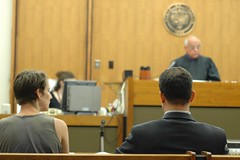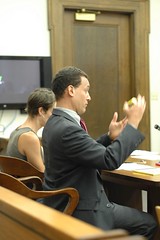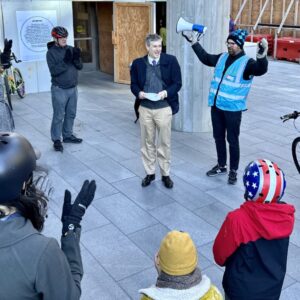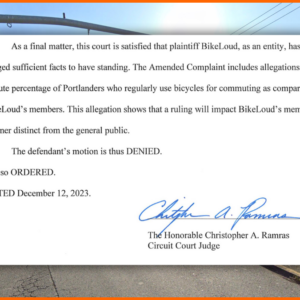Yesterday at the Multnomah County Courthouse the law came down against fixed gear bicycles.
On June 1, 2006 Portland bike messenger Ayla Holland was given a ticket for allegedly violating Oregon Revised Statute (ORS) 815.280(2)(a) which states,
A bicycle must be equipped with a brake that enables the operator to make the braked wheels skid on dry, level, clean pavement. strong enough to skid tire.
At issue was whether Holland’s fixed gear bicycle met this requirement. She and her lawyer Mark Ginsberg thought it did, but Officer Barnum of the Portland Police Bureau thought otherwise so they brought the matter in front of a traffic court Judge.
According to Officer Barnum, he stopped Holland at SW First and Jefferson and told her that she was in violation of the law and that she must put a front brake on her fixie to avoid a ticket. Holland disagreed. She and Ginsberg claim that Oregon statute does not clearly define what a brake is and that as long as a bicycle can perform a “skid on dry, level clean pavement” it does not need to have a separate, traditional braking device.
At the start of the trial it was clear that neither the Judge nor the Officer understood just what a fixed-gear bicycle was. To help them visualize, Ginsberg likened a fixie to a child’s Big Wheel. Once everyone was clear and the cop was finished with his opening testimony, Ginsberg began his cross-examination:
Ginsberg (to Officer Barnum):
“When you approached the rider did she stop?”
Officer Barnum:
“Yes.”
Ginsberg:
“How’d she stop the bike?”
Officer Barnum:
“I don’t know.”
Ginsberg:
“The gear itself stopped the bike.”
Officer Barnum:
“But the gear is not a brake.”
From the outset, the judge seemed to agree with the cop and it was up to Ginsberg to change his mind. The trial began to hinge on the definition of brake. Ginsberg continued to ask questions of the cop.
Ginsberg:
“What is a brake?”
Officer Barnum:
“A lever, a caliper or a coaster brake hub.”
Ginsberg:
“Can you show the court where in the vehicle code a brake is defined as such?”
Officer Barnum:
“No.”
Ginsberg:
“Did you at any time during the traffic stop ask my client if she could skid (thus meeting the performance requirement of the statute)?”
Officer Barnum:
“No.”
At this point the judge seemed increasingly exasperated with Ginsberg’s direction and pointed out that “brake” was a commonly accepted term. To end this line of questioning, Ginsberg offered to demonstrate to the court that Holland could easily bring her fixed-gear bike to a skid on dry, level pavement. The judge declined his offer.
Now it was time for Officer Barnum to ask questions. He asked Holland,
“What would you do if your chain broke?”
Holland:
“I would use my feet.”
Officer Barnum:
“What if your leg muscles had a spasm?”
Holland:
“I’m not sure…these are emergency situations.”
Ginsberg interjected with a question for Holland:
“Did any of these situations happen on the day you were stopped?”
Holland:
“No.”
Now it was time for Officer Barnum to submit his closing testimony. He continued to argue that nowhere in the statute does it say gears can be utilized as brakes (it doesn’t say they can’t either). He also said that “motorists and the public deserve to have these bikes be properly equipped,” and that a “skid is not as good or safe as a stop.” “The requirement,” he said, “has not been met.”
Now it was Ginsberg’s turn. He said,
“The state is overreaching in seeking to define a brake as a lever and a caliper. The question remains; is the fixed gear the brake? The statutes are clear that the answer is yes.”
To solidify his point, he took out a huge Webster’s dictionary and opened it to the word “brake.” The definition stated that a brake is a “device to arrest the motion of a vehicle.” It did not stipulate anything about a distinct lever or caliper. In his last few comments he proclaimed that the current statute is not well-written and that it is “frightening to require only a front brake.”
With both sides at rest, it was time for the Judge’s final opinion. His contention was that the main source of braking power on a fixed gear are the muscles of the rider, not the gear itself. To this end, he questioned how messengers—whom he’s seen riding “much too fast”—could stop safely.
In the Judge’s opinion, gearing itself and/or leg muscles are not a sufficient source of braking power. He said,
“The brake must be a device separate from the musclulature of the rider. Take me for instance. I don’t have leg muscles as strong as a messenger…how would I stop safely?”
He then turned directly to Ginsberg and said,
“If your client had a stick she could rub against her tire, you’d have a case. I don’t believe the defense has convinced me to broaden the definition of a brake. I find the defendant guilty.”
So now Holland has 30 days to either attach a hand brake to her bike and pay a $73 fine, or appeal the decision. In talking with her outside the courtroom it seemed like she did not think the Judge’s opinion was fair and I wouldn’t be surprised if she and Ginsberg decide to continue the fight.
This decision by the Judge raises some concerns and questions. Will the cops now feel emboldened to go out and ticket everyone on a fixed-gear? Are fixed-gears now essentially illegal? Are fixed-gears truly a public safety hazard?
Fixed gears have become a huge trend across the country and with hundreds if not thousands of them in Portland, I don’t think we’ve heard the end of this issue.
[jonathan_byline]










Thanks for reading.
BikePortland has served this community with independent community journalism since 2005. We rely on subscriptions from readers like you to survive. Your financial support is vital in keeping this valuable resource alive and well.
Please subscribe today to strengthen and expand our work.
Hate to say it, but I’m with the judge. You can indeed stop without a (conventional) brake on a fixed gear bike (I ride one too, with brakes), but anyone who claims they can stop as quickly without a brake as they could with one is ignoring the simple physics involved. To reverse the situation, there’s a reason you aren’t allowed a brake at the velodrome – you’d suddenly be able to stop far faster than the other riders, and could cause a nasty crash.
Lots of people (including me) have a brake on our fixed gears, and I think it’s a very good idea to run a front brake for use in emergencies at least – not to mention hills… A skidding rear tire (or tires) is one of the least efficient ways for a vehicle to stop…
That said, riding brakeless FG is legal according to this statute, it should remain legal, and the judge and cop are both nincompoops.
The judge clearly ignored the intent of the law, which is that bicycles must have a safe means to slow and stop. When you pull a brake lever aren’t you using you muscles to stop the bike? This guy is a real brainiac.
It is worth noting that modern hybrids and electric cars are being designed to use their generators as brakes . . . no levers or calipers there. The naroow lever/caliper paradigm betrays a lack of intelectual rigor too. Not surprised to see a cop having a hard time getting his head around it, but a judge? Sad. Appeal.
FYI – OBRA now requires brakes on fixies in races outside the velodrome.
From what I know of conventional bicycle physics wisdom, the front wheel is far superior in its braking ability. This can be easily tested on any bike with good working brakes on both front and rear. The rear wheel will lock and skid with a fraction of the effort and braking effect. Further, when the rear wheel skids it looses all its tracking ability – in effect, it is not a wheel when it is skidding. The bike is nearly out of control if either wheel is skidding. It is, however, nearly impossible to lock up the front wheel. Unless one is braking hard in a turn, it is better to use the front brake. If one had to choose only one wheel for braking it would be the front wheel.
Perhaps I do not understand the reluctance to have a brake on a bike, even it used for only emergency circumstances. Can someone explain? There are bigger issues to fight when it comes to traffic laws and the relationship between motorists and cyclists.
Take the $73 and buy a brake and beer and move on.
But hybrids do not have ONLY their generators available to stop with. The question is not can you stop, or even stop safely, it’s can you make a safe and expeditious emergency stop. Without a front brake (mechanism doesn’t matter) on a two-wheeled vehicle, you simply cannot stop as quickly. Would you feel safe riding a geared bike with a broken front brake in downtown traffic?
Cruiser bikes with coaster brakes are an interesting counter argument, but they are rarely ridden at speeds comparable to a fixed or road bike, and put much more rider weight over the rear wheel.
Judges frequently rule on the intent of the law rather than the narrow wording. This was obviously the case here: he felt that a fixed rear wheel did not allow for sufficient braking alone to meet the intent of the statutory requirement.
I also have a front brake, but from the physics standpoint, I wouldn’t want to skid it. What if the cop’s legs had a spasm, while he was driving?
regardless, the judge is wrong. If you can make the rear wheel skid, you have a brake. how else did it skid? the question is not how good the brake is.
Skidding is a red herring. The point of the skid is to establish that braking pressure (regardless of the source) can be applied that exceeds the amount needed to overcome the friction between the tire and the road. The most efficient and safest stop is one where the braking force barely equals the friction between tire and road, slowing the vehicle at the maximum rate. This principle applies equally to both cars and bicycles. If you can apply enough pressure to skid, then you can apply enough pressure to brake.
That being said, hand-activated brakes will be more effective than coaster brakes or fixed-gear pedalling back-pressure, because the reaction time is less – nerve impulses travel quicker to the actuating muscles for the hands in your forearms than they do to the actuating muscles in your upper and lower legs. At high speeds the reaction distance can be as much as 3 times the braking distance. (note that this paragraph does not reflect on the law, only on safety)
The biggest argument for mechanical brakes over human leg power is maximum force. If there is enough friction to support large braking forces, the maximum force that can be applied by a rider on an upright bike is the rider’s weight. (On a recumbant, it is the strength of the bicycle seat – most cyclists can leg press at least 1.5 times their own weight) The maximum braking force of a mechanical brake is limited by hand grip strength, but is typically much more than the weight of the rider.
Anyway, the point is, if you can skid, you can apply enough force to safely stop, and you’ve met the legal and practical definition of “braking”. Obviously, Mr. Ginsberg is aware of this and the Multnomah County judge in question disagrees. It’s simple physics, but physics is not intuitive for many people, judges included.
While my fixie has brakes I believe the officers reasoning to be faulty. Your hand uses muscles to pull a lever and the logic of a chain breaking can also be applied to the brake cable snapping, or the caliper snapping. The logic could also be used in a car, what would you do if your master cylinder failed….
At least on a bike you could use your feet, doesn’t really work in a car.
I would appeal
I ride fixed with two caliper brakes. I’m not going to take sides here, but I think the skid is vastly underestimated in braking effectiveness…it seems that some folks consider braking to cease or something when skidding, but wow…dragging a locked-motion rear wheel, rubber frictioning against the pavement…it’s slowing the bike, right? It’s like “throwing an anchor out.”
Is it a weight issue, or an issue of “style points”? Let me guess, style points and nothing more. One can have that brake and save it for emergencies only.
I love my one speed, but I do have a brake, all $11 worth at City Bike. The extra weight is not a burdon at all, and as for style points, the bike is still cool.
Show me a quick stop on a no brake fixie on a steep fast downhill, and I will change my mind.
Ride safe, ride fast, stop fast…Safety first on shared roads, do what you want at the track or free ride park.
Tankagnolo Bob
1) Shouldn’t the cops also stop everyone with a 50 year old wornout coaster brake or who have oily, dirty rims and brake pads that won’t stop the bike?
2) Skidding isn’t as effective as a non-skidding rapid slow down, since the coefficient of kinetic friction is lower than than the coefficient of static friction.
3) I don’t care if you’re Major Taylor — put a friction brake on your bike. Just about everyone eventually realizes that death by intersection isn’t as cool as it sounds. However, it probably shouldn’t be a legal requirement.
This is ridiculous for a simple reason:
One, coaster brake, on the rear wheel of a bicycle, is legal.
A brakeless fixie cannot stop as fast as a bike with a brake on the front. But it can stop as fast as a coaster brake can.
If the law wants to say, “Bicycles must have a brake on the front wheel,” that’s one thing. But that’s not where we’re at.
—
FWIW, I have front AND rear caliper brakes on my fixie…
Show me a hybrid car with no foot brake, silly analagy !!! One can downshift with a conventional four speed car too, but damn, there is that foot brake again !!! Give me a brake!!
Tankagnolo Bob
“Will the cops now feel emboldened to go out and ticket everyone on a fixed-gear?”
well, i just got a $97 ticket yesterday for not having any brakes, so i guess so. the cop mentioned that they are cracking down on this now and that it was first brought to his attention at critical mass.
I have a fixie in my stable. I practice with it. Braking with it is not as effective as with hand brakes. Think it is? Skid the tire immediately with the cranks in the 6 and 12 o’clock positions. Also, think about other people and not just yourself. If you were the only person on the road, or with other fixies that would be fine… but outside of the ‘drome, that’s not the case. I understand the desire to ride without traditional brakes on the road but in the end it isn’t as safe.
“This decision by the Judge raises some concerns and questions. Will the cops now feel emboldened to go out and ticket everyone on a fixed-gear? Are fixed-gears now essentially illegal? Are fixed-gears truly a public safety hazard?
Fixed gears have become a huge trend across the country and with hundreds if not thousands of them in Portland, I don’t think we’ve heard the end of this issue.”
Re-read your own report … the judge found the rider guilty for riding a fixed-gear without a brake; he didn’t rule fixed-gears “illegal” … just because you put a brake on the thing doesn’t mean you actually have to use it.
Why on earth would you not put at least a front brake on your fixed gear street rider? That is just absurd. There is no good reason for it at all.
Worried about weight? Take a crap before you ride. Jeez….
Absolutely Ludicris.
Sad that cops and judges can’t spend some time on more signficant safety issues. We all know there are bigger fish to fry.
Seems like people are answering two questions:
first, does it make sense to have a hand brake?
second, does the law require it?
I think that Mark’s right about the law. If he was using Webster’s Third New International, which I think is the standard dictionary for lawyers, and no where else in the vehicle code is brake defined, the court is simply wrong.
The judge’s reasoning is bogus. Brake separate from musculature? For hand brakes, that’s a part of the bike; for fixies, that’s the gear, part of the bike.
There’s another interesting question: why did the officer ticket the messenger? Dangerous riding? In fact, the messenger was able to stop, which was the purported reason for the ticket: inability to stop.
We’ll see what we can do to get the police to stop giving out these tickets, and to focus on true traffic safety problems.
The bigger question is why are we allowing a handful of non-experts push definitions of law without doing their homework to educate themselves into making sound decisions based in scientific evidence?
What I see is that your opinions do not matter. Now take your ruling and your brake and go home.
Does anyone else think this might open up precendence for the standardization of what is “street legal” for bicycles? I know there are already laws about reflectors and lights, but do we need to start regulating transmission and braking systems?
“Yes Officer, my bicycle is cleared by the BTA.”
I personally don’t feel like I have enough braking control on a fixie and would feel reluctant to ride around town without at least one handbrake. This is MY choice. However, I don’t think people who ride the fixies go “much too fast” or don’t have the control.
What the hell is this “much too fast” shit? Bicycles still can’t contend with the speeds of any motorized vehicle and can rarely exceed the speed limit of any regular traffic. So even at top speeds, aren’t we still safer than cars and motorcycles and scooters?
Fight this ticket! Fight!
I’m a little irritable today…
I was in court yesterday and witnessed another biker who has been ticked for “biking while fixed”.
I dont want to tell people how to live or how to ride. I dont care if someone is riding a freewheel and rely only on their ‘sole brakes’ to stop. If track bikes aren’t causing us to be less safe why should anyone care? (note: cars are the number one killer of people under the age of 38)
This is more about whether we choose to force others to live by our standards. total bullshit. People are dying, and cars are the reason. The cop is pathetic.
I commute (and race) a fixie with a front brake. I sometimes just use legs to stop and sometimes I use the front brake and sometimes (most times) I use both.
I think this is a bogus ruling because Ayla was able to stop (without ‘brakes’), however I think that there actually is a safety issue out there.
Not everyone is as skilled as the brakeless messengers riding around. A few days ago I watched a girl semi skid through the intersection coming off the broadway bridge going into town. She would have been creamed by a car making a legal green lighted right hand turn if she hadn’t skidded, turned, and almost put her bike down (furthermore, she almost crashed into me). A foot or two more into the roadway and she would have been creamed.
So I guess what I am saying, is that the police are justified in ticketing bikes for not being able to stop (regardless of the type of bike). If the rider can stop using his or her legs, more power to them. Frankly, though I fear for those that are emulating the messengers and can’t stop very well, but are riding brakeless (for the cool factor).
I feel bad for the messengers, as they are the ones that are going to feel the heat (and they are the ones most likely to be able to stop)
BTW: Another ‘scary’ trend I is the ‘fake fixie’. ie a Single Speed road bike- with a freewheel and only a front brake. This is a recipe for disaster.
I’m curious: can a fixie without hand brakes stop as quickly as an automobile going the same speed?
Does anyone know if there has been any data collected on this?
Stop flaming the persons’ personal preference for braking methods. The fact is you can brake on a fixed gear bike. the rider stopped when asked to. efficiency or lunacy, is not in question.
Sorry, I’m with the judge an the officer on this one. I ride a fixie on the streets and yes, it has real brakes. Why in the world would you not outfit your bike with a brake?
Brakeless bikes are for the track, not the street.
If you want a track-legal fixie, get a _second_ fixie and don’t bother putting a brake on that one.
skateboards don’t have brakes and they can legally operate in the downtown streets.
The Segway doesn’t have “brakes”, does it?
What about a unicycle? Does this mean I can no longer go around town on my Uni? That’s technically a fixie too, isn’t it?
UNICYCLISTS UNTIE!
As far as legal definitions, this seems pretty easy to defend:
A. A brake is “a restraint used to slow or stop a vehicle”.
B. The State already condsiders engines as brakes as demostrated by road signs “No Engine Braking Allowed”. Legs are the bicycle’s engine. The engine can be used as a brake.
Simple no?
Mr. Ginsberg?
John Boyd
The Oregonian has picked up this story. It’s already on their blog and should be in the paper tomorrow.
As far as I know, skateboards aren’t considered vehicles under Oregon state law; bicycles are. That’s the legal difference. As for unicycles…?
First off, any experienced fixed gear rider, like a messenger can stop a brakeless fix at least as well as a BMX bike with a rear handbrake will stop. I have read the law, and if the requirement is that you must be able to lock up the wheel, than skidding on a fixed meets that requirement. I hear you “But there is no brake.” Yes there is, it is the fixed hub. You resist the forward motion with your legs and the bike stops. That sounds like a braking action to me.
The other thing about this law is that a freewheel singlespeed with just a front brake does not satisfy the law, even though applying the braking force on the front wheel will stop a bike quicker than anything, it will not make the wheel skid, cuz your weight transfers toward the front of the bike when you brake.
The law needs to be re-written by someone who understands how bikes work and what a rider’s capabilities are.
It’s a faulty argument to make the case that engine braking in a truck is equivalent to leg braking on a fixie: every single one of those trucks has mechanical brakes and is required by law to have operational mechanical brakes. Sure, the engine can be used as a brake, but it is not their sole method of braking.
Its been said several times, but maybe we need to go over it again. There are TWO questions:
1. Is riding a brakeless fixie safe?
2. Is riding a brakeless fixie legal?
I guess we can argue about whether or not it’s safe, or whether it SHOULD be legal, but hose are beside the point of this court case.
To me this case is about whether cops can ticket you for riding something they don’t think is safe, even if it is completely legal. If you think about it, riding in a car is safer than riding on a bike–so what would keep a cop from ticketing ALL bike riders now, just because he thinks its not safe?
It’s not about safety, it’s about whether cops can make up the rules as they go along. This sets an awful precedent and all cyclists and all citizens should be alarmed.
Some other points:
The first “safety bicycles” were fixed gear without caliper brakes. The coaster brake camealong later. So, if you go far enough back in history, the “traditional” way of stopping a bike is by resisting the forward motion of the pedals.
If the chain broke or derailed on a coaster brake bike, you would also be left with no brakes. I had my chain come off my fixed on Broadway, going downhill. I stopped by rubbing my foot against the side if my tire.
The point is that “brake” isn’t defined by the law. It’s fine & dandy that the judge says that “brake” is a common term, but a parking brake meets the common term definition of “brake” and yet doesn’t meet the restrictions of the law.
While I think a front brake is a good idea, by no means should it be required if the rider can come to a quick controlled stop. Whether it’s a stick, feet, or 8″ disc brakes.
As far as the skateboard having no brakes point? I got a ticket the other day for doing powerslides going down a hill. A powerslide is by far the quickest and safest way to stop on a skateboard if done properly. The officer called them crashes. I got a ticket for “improper position in the roadway.” He also lied to me, and said several time, “skateboards are not allowed on any street in portland, maybe you should read up on your law.”
I see some parallels here…
“The brake must be a device separate from the musclulature of the rider. Take me for instance. I don’t have leg muscles as strong as a messenger…how would I stop safely?”
Um…. don’t pedal as fast in the first place? This is a good example of a poor judgement by the justice in question. If you are unable to cause the wheel to skid at any speed, don’t ride a fixie. If you can cause it to skid, but not if you’re going 20 mph, then SLOW DOWN. Riding / driving too fast for conditions is a whole ‘nother issue, and involves a completely different statute.
We can “what if?” all day. For instance, what if the cable snapped on your freewheel-equipped bike? “What if you went to squeeze the lever and had a sudden attack of carpel tunnel syndrome.
Also you can “skip stop” a fixed bike too. A skip stop is when you lift the rear wheel and set it down while resisting the forward motion of the pedals. Do this 3 times and you are at a complete stop.
Sorry for the multiple posts but this subject hits on about 18 of my pet peeves about peoples perceptions of what is safe on a bicycle.
Interesting discussion. How could the officer possibly know that it isn’t a coaster brake? What if the chain on my 1970’s Schwin Cruiser breaks? Same problem.
But as a fixed gear rider for several years, I have absolutely no doubt that a fixie with a front brake can stop faster than without. And if the rider is tired, it can make stopping even more difficult. Sheldon Brown, whom I consider the preeminent authority on the matter, agrees: http://www.sheldonbrown.com/fixed.html
And another thing…it is bad form to lock your elbows!
I don’t like the precedent that this decision sets. The judge seems to have made a call based on what he believes is safe – while not even understanding the terminology/mechanics. Not based on the reading of the law.
Was the ‘anti-bike cop coalition’ sitting around in the donut shop at their monthly meeting when one of them came across the legal definition and had a eureka moment?
I hope this is appealed…
If this is the case can somebody please ticket the meth-heads that come screaming into an intersection with no brakes and their feet dragging trying unsuccessfully to slow themselves down?
maybe the cops should carry around brakes like they did with lights and give them away for free
1. When I was 10 I took all the brakes off my BMX bike and used to stop by mashing my shoe against the rear tyre. My mum used to get so mad, I went through shoes pretty quickly.
2. I want to know how much dinero Ayla is paying Ginsberg. So far a $73. fine and a brake seem like they would be cheaper than fighting the legal battle. Mark must be doing this pro bono.
3. Come on we all know what the heck the law means. The judge may be an nincompoop but he wouldn’t be forced to use nincompoop thinking if we (cyclists) weren’t trying to make such a ridiculous argument.
4. I used to ride without a helmet when I was a kid- gasp!!!!
I guess I’ll have to send my newly restored Penny-Farthing bicycle to the dumpster.
Exactly Chris–this is only a notable case because the cop and judge use their own idea of what is safe on a bike, rather than any reasonable reading of the law itself.
It doesn’t matter what the law should be–take that up with your congressman. It does matter what the law is. Brakeless fixies are legal, which is qute a different question from whether they should be legal.
Good point Adam. But there is the rub, and the reason we have more lawyers than social workers, you see the letter, not the spirit of the law.